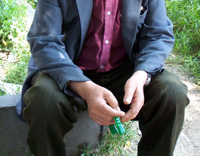I would like to apologize to all the people I know and don’t know with speech defects by starting with a joke: A man that stutters asks someone on the street where the stuttering school is located.
“Hey man, you stutter well, why do you need to go to a special school?” says the other man, who probably doesn’t differentiate between the school and the educational system.
These days, the most talked about subject in Armenia is university admission exams. Some people have applicants in the family, some ask about their neighbors’ children, while some are simply interested in the political and economic perspectives of this major event.
The families that have children applying for admission or feel sorry for their friends’ children are more interested in the statistics and the dynamics of it all. Whoever is interested in the politics and economics of it all wants to know what the chances are for Nikol Aghbalyan’s and Levon Shant’s political parties to breakthrough during the 2007 parliamentary elections. After all, there won’t be any competition between the “Prosperous Armenia” party members and non-members and there will be resources needed to put up the posters reading “Old Friends Don’t Betray”.
Frankly, I could care less about any of this. What worries me is that the children that happily graduate from school and enter the real world find themselves in a passage, which we can call “an environment of uneducated people”. Why?-because the only thing that ties the school with an institution of higher learning is not providing a good education. On different occasions, I have talked with teachers and university professors and they have all said that the level of education is far from being considered satisfactory. The short time for studying and taking admission exams has nothing to do with the school or the university. The tutors don’t even ask how the child is doing in school.
So, what we have is a gladiatorial performance during the months of July and August and the participants are the future of Armenia. The people sitting in the exam room greet the male and female applicants with a look on their faces that reads, “So, tell me what you know”. In other words, dear boy or girl, how can you memorize what you haven’t learned and make it so we don’t find an error? The gladiatorial performance turns into an absurd play.
The applicant that has graduated from the school with no education and is trying to enter the unsatisfactory university is asked to take into consideration the context of the English text assigned to orally translate. Well, if I can stutter well, then why do I need to go to a school? Is the university education of Armenia ready to provide the applicant that understands the context with the same level of education, or is the person who wasn’t able to go on vacation this year trying to make fun of the applicant? The applicant, who witnessed this (he got a low grade for what he did) called his friend and warned him to translate the given sentence the way he had because the test makers are asking for the context. The friend got the same text and when he translated that sentence, he got it wrong.
The committee lowered the score of an applicant taking a math exam just because there were two ways to solve the problem he was given and the applicant only chose one of them. There are a lot of absurd corrections for the Armenian history exam, but the most apparent is the line drawn under Commander Smbat. It turns out that the applicant taking an exam for the history department had to write “Armenian Commander Smbat, so the committee wouldn’t suspect the commander being from somewhere like Vietnam. This year, I heard something that I have never heard before: “a person kneeling down”. An applicant who had successfully passed the oral part of the German language exam and was striving for a high score, was asked: “How would you say “a person kneeling down” in German?” The applicant didn’t remember. The committee members were offended because the Armenian taking a German language exam doesn’t know how to translate that highly significant word in German.
They probably thought, “How could you? Let’s say you go to Germany or Austria and they ask you, for example, about the Armenian National Assembly, how are you going to describe it? How are you going to talk about our history and culture? I’m afraid you don’t even know how to translate “border”, “sunflower seeds”, “chew” in German. Go, or else we might lower your score even more, etc….”

